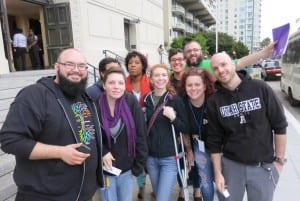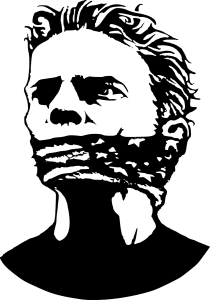 A few years back at an open mic I hosted, we instituted a new set of rules focused on social justice ideals. The first and most basic rule was “No hate speech.” We didn’t want racist jokes or personal attacks, and when I put that into our rules I figured it would be a pretty simple rule to enforce. When we announced the rules, we would remind people that we respected free speech but didn’t believe in speech that’s free from consequence. We expected that we could cut off anything that was purely an attack on a group, and anything than was less directly inflammatory would be discussed and policed as problematic by the community. I thought we were saying “no” to slurs and addressing less direct expressions of racism and sexism on a personal level.
A few years back at an open mic I hosted, we instituted a new set of rules focused on social justice ideals. The first and most basic rule was “No hate speech.” We didn’t want racist jokes or personal attacks, and when I put that into our rules I figured it would be a pretty simple rule to enforce. When we announced the rules, we would remind people that we respected free speech but didn’t believe in speech that’s free from consequence. We expected that we could cut off anything that was purely an attack on a group, and anything than was less directly inflammatory would be discussed and policed as problematic by the community. I thought we were saying “no” to slurs and addressing less direct expressions of racism and sexism on a personal level.

That self-policing was incredibly successful for a few months. Our community grew closer over discussions about why people were hurt or felt attacked by performances, and there were only a couple of instances when we had to pull someone for using slurs or directly attacking someone from the stage. But as the hosts settled into this new power, things started to change. We had a Mexican-American man pulled off stage for making a joke about himself being lazy because he was stereotyping. We had a woman scolded for being too graphic talking about her period right after someone else graphically described sex with her boyfriend. The simple “no hate speech” had turned into a quagmire where one night a host might pull you for getting too erotic on the microphone, and another night a different host would praise the same performance as daring and sex-positive. The enforcement and interpretation of those three words varied wildly based on who was hosting that particular night and how they felt that day. The hard line between personal attack and personal discomfort blurred completely, and the constructive conversation started to feel more like an expression of bias.
 After trying and failing to shift the focus back to self-policing for months, I ended up stepping down at least partly because of the bastardization of those three simple words, because discourse was viewed as a harder path than just silencing or shaming someone you didn’t agree with. The idea that free speech is not consequence-free speech can be a hard concept to struggle with, and when you’re highly sensitive to injustice it can be tough to make those consequences reasonable. For our little open mic, that resulted in the silencing of some voices who might have taught us some things. On a grander scale, this is happening with our discussions of politics, of social justice, and of every structure of our society and creating a culture of combative responses to problems that could be chances to grow instead. More and more, it seems that the public voices guiding these discussions suffer the same effect — we cut the mic on dissenting opinions on news entertainment shows and cut the feed when someone oversteps a boundary they didn’t realize was there. Regulating someone else’s speech is almost never a great idea unless you’re trying to force a particular perspective, but asking people to think twice about what they’ve said gives them a chance to learn from their mistake. That’s a chance that we lose when we stretch our interpretation of a decree that seems as simple as “no hate speech” and redefine hate speech for our own intentions.
After trying and failing to shift the focus back to self-policing for months, I ended up stepping down at least partly because of the bastardization of those three simple words, because discourse was viewed as a harder path than just silencing or shaming someone you didn’t agree with. The idea that free speech is not consequence-free speech can be a hard concept to struggle with, and when you’re highly sensitive to injustice it can be tough to make those consequences reasonable. For our little open mic, that resulted in the silencing of some voices who might have taught us some things. On a grander scale, this is happening with our discussions of politics, of social justice, and of every structure of our society and creating a culture of combative responses to problems that could be chances to grow instead. More and more, it seems that the public voices guiding these discussions suffer the same effect — we cut the mic on dissenting opinions on news entertainment shows and cut the feed when someone oversteps a boundary they didn’t realize was there. Regulating someone else’s speech is almost never a great idea unless you’re trying to force a particular perspective, but asking people to think twice about what they’ve said gives them a chance to learn from their mistake. That’s a chance that we lose when we stretch our interpretation of a decree that seems as simple as “no hate speech” and redefine hate speech for our own intentions.
I go back about once a month to see what’s become of things since I put those three words into our rules, and I’m glad to say that something in the air has changed since I left. The focus is back on the opportunity to grow from our differences in perspective. People are still being called out for being problematic, but they’re not being silenced or shamed for lacking some understanding. Most of those smaller, cringe-worthy moments come from a genuine misunderstanding, and the new guard there have been great about trying to build empathy instead of shame. It can be hard to look someone in the eye and tell them why you disagree with what they think or say, and it doesn’t get any easier when what they’ve said upsets you in a significant way, but until we can overcome that discomfort we’ll never be able to get beyond our surface level reactions to injustice and find a place to really build a better understanding. That understanding — that ability to react to injustice on a personal level without just lashing out — that’s what really stops the hate speech.




I have tried to shed some light into dark areas. Hopefully entertaining as I do.
Thank you for this insight.
I’m about to start an open mic night, and we discussed this briefly at an organizational meeting last night! Can you tell me the name of the open mic you referenced, and if it’s still going?